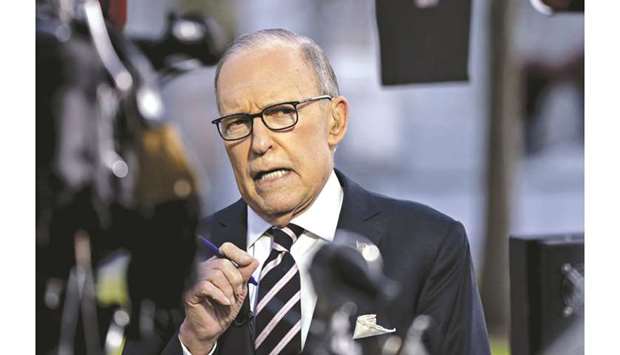The US and China are trying to agree on the amount of American agriculture products that Beijing is willing to purchase, said White House economic adviser Larry Kudlow, who declined to repeat President Donald Trump’s advice to farmers two months ago to buy more tractors and land.
The two sides are in “almost around-the-clock” negotiations on some of the most “delicate” matters, including a dollar amount of commodity purchases, he said Friday in an interview with Bloomberg Television.
“The final strokes are not there, we’re coming down to short strokes,” he said. “Now, some of the most delicate matters have to be adjudicated, discussed, analysed and evaluated.
And then it will be presented to President Trump, and he’ll take a look at it.”
While negotiators are close to phase one of a broader trade deal and “progress has been made,” they haven’t yet put anything in writing and top officials have no current plans to meet face to face, he said.
Trump has threatened to impose tariffs on Chinese imports if an accord isn’t reached by mid-month, which Kudlow said could still happen.
“There are no arbitrary deadlines on any of this,” he said. “On the other hand, December 15 is a very important date, because if the agreement isn’t complete, our current law will restore tariffs.”
Eight weeks ago, Trump announced that a phase-one agreement had been reached between Washington and Beijing, subject to getting it down on paper in a process that might take three to five weeks.
According to Trump at the time, China agreed to $40bn to $50bn in US agricultural goods annually – a quantity so large, he indicated, that farmers should invest in more equipment and land.
Asked today about the president’s advice, Kudlow stopped short of repeating it.
“I don’t want to tell the farmers what they should and should not do,” he said. “I’m not going to give them free advice on how they run their businesses.”
Stocks have zigzagged this week on conflicting signs of progress in a trade war between the world’s two largest economies that has led to the biggest volley of tariffs since the 1930s.
In recent days, American and Chinese negotiators have signalled that they may be drawing closer to signing phase one.
Trump diminished expectations for it to happen soon when he said earlier this week that he wouldn’t mind if it takes until after the 2020 US election to get a deal.
Meanwhile, China is in the process of waiving retaliatory tariffs on imports of US meat and soy by domestic companies, a procedural step that may also signal a broader trade agreement with the US is drawing closer.
Earlier on Friday, the Labour Department said payrolls jumped 266,000 in November, the most since January, after an upwardly revised 156,000 advance the prior month.
The jobless rate dipped to 3.5%, matching the lowest since 1969.
Average hourly earnings climbed 3.1% from a year earlier, exceeding projections.
“The economy is outperforming expectations,” Kudlow said.

Kudlow: The US economy is outperforming expectations.
